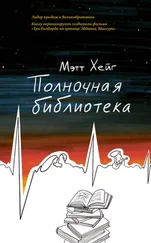Мэтт Хейг - How to Stop Time
Здесь есть возможность читать онлайн «Мэтт Хейг - How to Stop Time» весь текст электронной книги совершенно бесплатно (целиком полную версию без сокращений). В некоторых случаях можно слушать аудио, скачать через торрент в формате fb2 и присутствует краткое содержание. Год выпуска: 2017, Издательство: Canongate Books, Жанр: Современная проза, на английском языке. Описание произведения, (предисловие) а так же отзывы посетителей доступны на портале библиотеки ЛибКат.
- Название:How to Stop Time
- Автор:
- Издательство:Canongate Books
- Жанр:
- Год:2017
- ISBN:нет данных
- Рейтинг книги:4 / 5. Голосов: 2
-
Избранное:Добавить в избранное
- Отзывы:
-
Ваша оценка:
- 80
- 1
- 2
- 3
- 4
- 5
How to Stop Time: краткое содержание, описание и аннотация
Предлагаем к чтению аннотацию, описание, краткое содержание или предисловие (зависит от того, что написал сам автор книги «How to Stop Time»). Если вы не нашли необходимую информацию о книге — напишите в комментариях, мы постараемся отыскать её.
How to Stop Time — читать онлайн бесплатно полную книгу (весь текст) целиком
Ниже представлен текст книги, разбитый по страницам. Система сохранения места последней прочитанной страницы, позволяет с удобством читать онлайн бесплатно книгу «How to Stop Time», без необходимости каждый раз заново искать на чём Вы остановились. Поставьте закладку, и сможете в любой момент перейти на страницу, на которой закончили чтение.
Интервал:
Закладка:
‘Leave him,’ he says, his voice muffled, backing away, and my heart breaks for him. ‘C’mon, let’s go.’
Time, I realise, is a weapon these days. Nothing weakens people like having to wait. In the street. With a knife in their hand.
‘It’s small,’ I say, referencing the knife.
‘What?’
‘Everything gets smaller over time. Computers, phones, apples, knives, souls.’
‘Stop talking, man, now or for ever.’
‘Apples used to be giant . You should’ve seen them. They were like green pumpkins.’
‘Fucking shut up, you dead cunt.’
‘Have you ever killed someone?’
‘Fuck, man. Phone and wallet. Or I slice your throat.’
‘I have,’ I told him truthfully. ‘It’s horrible. You don’t want that feeling. It’s as though you become dead yourself. Like their death inhabits you. It sends you insane. And you carry it, you carry them, inside you, for ever . . .’
‘Stop talking.’
My eyes lock with his. I press the invisible force of centuries into him.
Abraham growls again. A growl that becomes a bark.
‘He’s basically a wolf. Very protective. If you stab me you just better make sure I don’t let go of the lead.’
The knife trembles a little, with the boy’s fear. Maybe it is this. This shame of his own fragility that makes him lower his arm.
‘Fuck this, man,’ he says. He walks away, backwards, then fast, with the other boys following. Anton steals a glance back at me and I smile and confuse him more. I understand. The way you can get caught up in things, find yourself floating, heading towards trouble you can hardly avoid.
Hackney, near London, 1599
They didn’t live in Bow. They lived further out, in a small narrow house on Well Lane, in the village of Hackney. There were a lot of strawberry fields and fruit orchards in Hackney at that time. Compared to much of the areas in and around London, Hackney smelled quite inoffensive, and the air healthy to inhale, though it was very different to the countryside I had known in Suffolk. For one thing, there had been a theatre there. It had been dismantled a few months before I arrived, but Rose told me it had been wonderful and that Richard Burbage himself had performed there and Lord Brown the bear.
I don’t know if it was the result of having a theatre but Hackney seemed to be a more open-minded kind of village than Edwardstone. There was no palpable fear of the outsider. Well, except for a lady called Old Mrs Adams who spat at people she walked past and often shouted ‘Shit-arse’ or ‘You walking Hell turd’ at them, but people laughed it off. And that didn’t really feel like fear of the outsider so much as general hatred for everyone, which was at least a non-discriminatory attitude.
‘She spat on my apples once and Grace went for her like a wild cat,’ Rose said, the first time I was Hell-turded, which was on my first walk to their cottage.
Their cottage was a timber and plaster affair, near a small stone wall that had its own overly ambitious name – the Great Stone Wall – and was a pebble’s throw from a modest stretch of water known as the Great Horsepond. The horses in question could mainly be found in a barn called – I kid you not – the Great Barn.
There was another barn behind that – called, alas, Oat Barn – and beyond there were the fruit orchards, with trees crammed close together for acres and acres. Further along was the stone circle of the well itself, tucked amid beech trees. To a twenty-first- century gaze it would all look quite rustic but to mine, then, the various walled partitions of the land and the close proximity of the trees in the orchard made it seem a very modern kind of place.
Rose and Grace had a deal with one of the local fruit farmers, whereby they would pick and sell the fruit of the season – plums and damsons and cherries, but also apples and greengages and gooseberries – and split the money they made unevenly in the favour of the farmer, Mr Sharpe, ‘a tight-fisted miser’, who had cultivated the fruit.
The cottage had more windows than I had seen in a house for a long time. It was nothing at all to what I had known in France, but it was a more advanced kind of lodging to the one I’d known in Edwardstone.
‘So,’ Rose asked me. She had a forthright look about her. A grown-up, take-no-nonsense look. ‘What is your name?’
‘Tom,’ I said. Which was the truth. But then I worried about the truth of me, and how it was dangerous. So I lied about my surname, for the first of many times: ‘Tom Smith. ’
‘And so, how old are you, Tom Smith?’
I had to be careful here. The truth – eighteen – probably wouldn’t have been believed. And if it had been believed then it would have been dangerous for her to know. And yet I simply could not tell her the age she most likely assumed, thirteen or fourteen.
‘How old are you?’
She laughed at me. ‘I asked you first.’
‘I have sixteen years.’
She didn’t bat an eye at that. I suppose I was lucky in that when the condition took hold I was already tall, thick-necked and broad-shouldered. ‘Your eyes look older,’ is all she said. Which I found a marvellous comfort, as everyone in Edwardstone had been convinced I was set in stone in my early teens.
‘And I have eighteen,’ she said. ‘And Grace has ten.’
This was fine. This talk. It was fine. But I didn’t want to reveal any more. I couldn’t. I was a dangerous secret. It was better for them not to know about me.
They gave me a meal of bread and parsnip pottage and cherries.
Rose’s smile was like warm air. ‘You should have been here yesterday. We had pigeon pie. Grace is a master pigeon-catcher.’
Grace mimed catching a pigeon and twisting its neck.
A moment passed. Then, inevitably, another question.
‘Why did you come here?’ Rose asked.
‘You invited me.’
‘Not here. Why were you heading to London? On your own? What are you fleeing from?’
‘Suffolk. If you had ever been there you wouldn’t even question it. It is full of pig-headed superstitious hateful people. We were from France, you see. We never fitted in there.’
‘We?’
‘I mean, when my mother was still alive.’
‘What happened to her?’
I stared at Rose. ‘There are some things I would rather not talk of.’
Grace noticed my hand, the one holding the soup spoon. ‘He is shaking.’
‘He is also across the table,’ Rose said. ‘You can speak as if he is here.’ Then her eyes were upon me again. ‘I didn’t mean to upset you.’
‘If the price of this food and a night of comfort is to talk of painful things then I would rather sleep outside in a ditch.’
Rose’s eyes flashed with anger. ‘You will find Hackney has some excellent ditches.’
I put down my spoon and stood up.
‘Do they never jest in Suffolk?’
‘I told you I am from France. And I am in no mood for jesting.’
‘You are a sour thing, aren’t you? Curdled like milk.’
Grace made a show of sniffing the air like a dog. ‘He even smells sour.’
Rose was stern with me. ‘Sit down, Tom. You have nowhere to go. And besides, you must stay here until you have paid us what you owe.’
I was a mess. I was confused. There was too much intensity inside me, after three weary days of walking and grieving. I wasn’t angry with these sisters, I was grateful to them, but that gratitude was swallowed up inside the pain of closing my eyes and seeing Manning’s hands.
‘You are not the only one with sorrows in this world. Don’t hoard them like they are precious. There is always plenty of them to go around.’
‘I’m sorry,’ I said.
Rose nodded. ‘That is all right. You are tired. And other things. You will sleep in the boys’ room.’
Читать дальшеИнтервал:
Закладка:
Похожие книги на «How to Stop Time»
Представляем Вашему вниманию похожие книги на «How to Stop Time» списком для выбора. Мы отобрали схожую по названию и смыслу литературу в надежде предоставить читателям больше вариантов отыскать новые, интересные, ещё непрочитанные произведения.
Обсуждение, отзывы о книге «How to Stop Time» и просто собственные мнения читателей. Оставьте ваши комментарии, напишите, что Вы думаете о произведении, его смысле или главных героях. Укажите что конкретно понравилось, а что нет, и почему Вы так считаете.
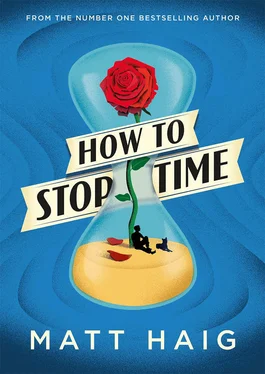
![Мэтт Хейг - Влюбиться в жизнь [Как научиться жить снова, когда ты почти уничтожен депрессией]](/books/28868/mett-hejg-vlyubitsya-v-zhizn-kak-nauchitsya-zhit-sn-thumb.webp)
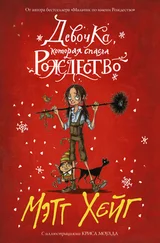
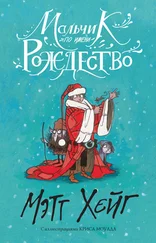
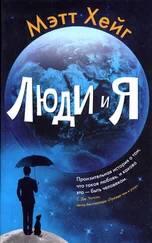

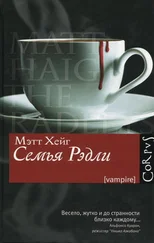
![Мэтт Хейг - Полночная библиотека [litres]](/books/388474/mett-hejg-polnochnaya-biblioteka-litres-thumb.webp)
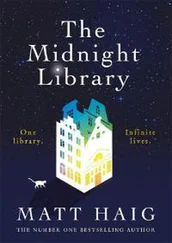
![Мэтт Хейг - Клуб призрачных отцов [litres]](/books/392121/mett-hejg-klub-prizrachnyh-otcov-litres-thumb.webp)

![Мэтт Хейг - Отец Рождество и Я [litres]](/books/421076/mett-hejg-otec-rozhdestvo-i-ya-litres-thumb.webp)
